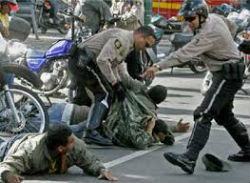The number of security personnel murdered in Venezuela rose nearly 20 percent in 2014, a reflection of the rising violence in the country and the possible high level of corruption within the security forces.
The Venezuelan non-governmental organization Fundepro registered 338 killings of police, military, and private security officials in the country last year, reported El Universal. This represents an 18 percent increase from the 295 homicides of security forces in 2013, but a slight drop from the 350 reported cases in 2012.
With 132 homicides last year, Caracas registered more than double the number of murdered security officials from any other state in Venezuela (see graph below by El Universal). Municipal police were the most targeted, while state and military forces also suffered over 50 casualties. Thirty-one members of Venezuela’s investigative police force, CICPC, were reportedly killed in 2014.
In an email correspondence, Fundepro told InSight Crime its data was based on police and military statistics as well as media reports.
If the beginning of 2015 is any indication, the violence directed towards security forces is unlikely to abate in the near future. Twenty police, military, and private security guards were killed during the first 19 days in 2015, according to El Universal.

InSight Crime Analysis
Attacks on security forces are a tricky thing to decipher. The security forces are often vulnerable in places like Venezuela because they are chronically short-staffed, underfunded, undertrained and under-equipped. What’s more, the high rates of violence in the country puts them in extremely vulnerable positions.
Fundepro said the violence against security forces was related to the ease with which criminals can get weapons. One year after the implementation of a disarmament law, authorities reported less than one percent of all illegal firearms in the country had been seized.
In response to this insecurity some police recently told a newspaper they were doing the minimum necessary to stop crime in the streets due to the risk they felt while on patrol. An increasing number of law enforcement officers are also reportedly quitting the force and opting to work for private security companies, which they consider safer.
SEE ALSO: Venezuela News and Profiles
On the other hand, security forces are also known to be involved in kidnapping and extortion operations; elements of the country’s military have been connected to the country’s drug trade. On the local level, the head of Venezuela’s police reform commission, Freddy Bernal, recently stated the commission plans to intervene in nine municipal police forces with links to organized crime.

